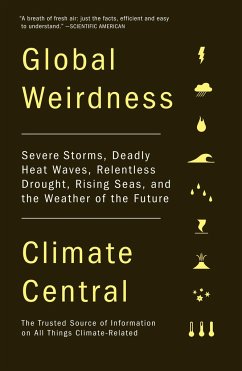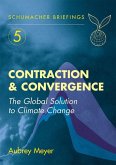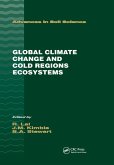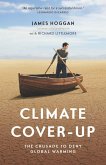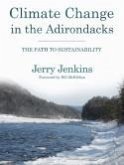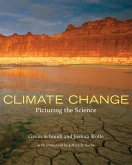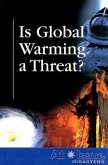Climate Central
Global Weirdness
Severe Storms, Deadly Heat Waves, Relentless Drought, Rising Seas, and the Weather of the Future
16,99 €
inkl. MwSt.
Versandfertig in über 4 Wochen

8 °P sammeln
Climate Central
Global Weirdness
Severe Storms, Deadly Heat Waves, Relentless Drought, Rising Seas, and the Weather of the Future
- Broschiertes Buch
- Merkliste
- Auf die Merkliste
- Bewerten Bewerten
- Teilen
- Produkt teilen
- Produkterinnerung
- Produkterinnerung
Global Weirdness summarizes everything we know about the science of climate change, explains what is likely to happen to the climate in the future, and lays out, in practical terms, what we can do to avoid further shifts. In sixty easy-to-read entries, Climate Central tackles basic questions such as: -Is climate ever "normal"? -Why and how do fossil-fuel burning and other human practices produce greenhouse gases? -What natural forces have caused climate change in the past? -What risks does climate change pose for human health? -What accounts for the diminishment of mountain glaciers and small…mehr
Andere Kunden interessierten sich auch für
![Contraction and Convergence: The Global Solution to Climate Change Volume 5 Contraction and Convergence: The Global Solution to Climate Change Volume 5]() Aubrey MeyerContraction and Convergence: The Global Solution to Climate Change Volume 514,99 €
Aubrey MeyerContraction and Convergence: The Global Solution to Climate Change Volume 514,99 €![Global Climate Change and Cold Regions Ecosystems Global Climate Change and Cold Regions Ecosystems]() Global Climate Change and Cold Regions Ecosystems94,99 €
Global Climate Change and Cold Regions Ecosystems94,99 €![Climate Cover-Up: The Crusade to Deny Global Warming Climate Cover-Up: The Crusade to Deny Global Warming]() James HogganClimate Cover-Up: The Crusade to Deny Global Warming14,99 €
James HogganClimate Cover-Up: The Crusade to Deny Global Warming14,99 €![Climate Change in the Adirondacks Climate Change in the Adirondacks]() Jerry JenkinsClimate Change in the Adirondacks27,99 €
Jerry JenkinsClimate Change in the Adirondacks27,99 €![Climate Change: Picturing the Science Climate Change: Picturing the Science]() Gavin SchmidtClimate Change: Picturing the Science23,99 €
Gavin SchmidtClimate Change: Picturing the Science23,99 €![Is Global Warming a Threat? Is Global Warming a Threat?]() Is Global Warming a Threat?34,99 €
Is Global Warming a Threat?34,99 €![Conservation by the People Conservation by the People]() Conservation by the People36,99 €
Conservation by the People36,99 €-
-
-
Global Weirdness summarizes everything we know about the science of climate change, explains what is likely to happen to the climate in the future, and lays out, in practical terms, what we can do to avoid further shifts. In sixty easy-to-read entries, Climate Central tackles basic questions such as: -Is climate ever "normal"? -Why and how do fossil-fuel burning and other human practices produce greenhouse gases? -What natural forces have caused climate change in the past? -What risks does climate change pose for human health? -What accounts for the diminishment of mountain glaciers and small ice caps around the world since 1850? -What are the economic costs and benefits of reducing carbon emissions? Illustrated throughout with clarifying graphics, Global Weirdness enlarges our understanding of how climate change affects our daily lives, and arms us with the incontrovertible facts we need to make informed decisions about the future of the planet, and of humankind.
Hinweis: Dieser Artikel kann nur an eine deutsche Lieferadresse ausgeliefert werden.
Hinweis: Dieser Artikel kann nur an eine deutsche Lieferadresse ausgeliefert werden.
Produktdetails
- Produktdetails
- Verlag: Penguin Random House LLC
- Seitenzahl: 224
- Erscheinungstermin: 7. Mai 2013
- Englisch
- Abmessung: 203mm x 128mm x 20mm
- Gewicht: 232g
- ISBN-13: 9780307743367
- ISBN-10: 0307743365
- Artikelnr.: 36596834
- Herstellerkennzeichnung
- Libri GmbH
- Europaallee 1
- 36244 Bad Hersfeld
- gpsr@libri.de
- Verlag: Penguin Random House LLC
- Seitenzahl: 224
- Erscheinungstermin: 7. Mai 2013
- Englisch
- Abmessung: 203mm x 128mm x 20mm
- Gewicht: 232g
- ISBN-13: 9780307743367
- ISBN-10: 0307743365
- Artikelnr.: 36596834
- Herstellerkennzeichnung
- Libri GmbH
- Europaallee 1
- 36244 Bad Hersfeld
- gpsr@libri.de
This book was produced collectively by scientists and journalists at CLIMATE CENTRAL, a nonprofit, nonpartisan science and journalism organization. The book was written by Emily Elert and Michael D. Lemonick; prior to external scientific peer review, it was reviewed by staff scientists Philip Duffy, Ph.D. (Chief Scientist), Nicole Heller, Ph.D. (ecosystems and adaptation), Alyson Kenward, Ph.D. (chemistry), Eric Larson, Ph.D. (energy systems), and Claudia Tebaldi, Ph.D. (climate statistics).
Introduction
I WHAT THE SCIENCE SAYS
1 “Normal Climate” Meant Something Different to the Dinosaurs and the
Woolly Mammoths than It Does to Us.
2 The Climate Has Changed Dramatically in the Past.
3 Our Ancestors Survived Climate Change. But It Wasn’t Always Pretty.
4 Dinosaurs Didn’t Drive Gas-Guzzlers or Use Air-Conditioning.
5 Carbon Dioxide Is Like a Planetwide Sweat Suit (Sort Of).
6 “ Global Warming” or “Climate Change”? Doesn’t Matter, It’s All the Same.
7 Weather Is Not Climate. Climate Is Not Weather. Except They Kind of Are.
8 On Venus, the Greenhouse Effect Makes It Hot Enough to Melt Lead.
9 Carbon Dioxide Is Only Part of the Problem.
10 Once We Invented the Steam Engine, Climate Change Was Pretty Much
Inevitable.
11 The Ozone Hole Is Not Global Warming. Global Warming Is Not the Ozone
Hole.
12 The Northern Hemisphere Has Heated Up More in the Past Half Century than
in Any Similar Period Going Back Many Hundreds of Years.
13 Coal Alone Churns Out 20 Percent of Human Greenhouse Emissions.
14 A Quarter of the CO2 in the Atmosphere Comes from Fossil Fuels, and It’s
on the Way Up.
15 If We Stopped Burning Fossil Fuels, We’d Keep Emitting Greenhouse Gases.
16 No Natural Force Has Been Able to Explain the Recent Warming.
17 CO2 Could Stay in the Air for Hundreds or Thousands of Years, Trapping
Heat the Whole Time.
18 Extra CO2 Going into the Sea Is Making the Ocean More Acidic.
19 Cutting Down Forests Means More CO2 Stays in the Atmosphere.
20 Stop All Greenhouse Emissions and the Temperature Will Keep Going Up.
21 Want an Exact Number for How Warm It Will Get? Sorry, Scientists Don’t
Have One.
22 Melting Ice Makes the Ocean Rise—but It’s Not the Only Factor.
23 Nobody Ever Said Global Warming Means Every Year Will Be Hotter than the
Last.
24 Nobody Ever Said the Whole World Will Warm Up at the Same Rate.
25 The Poles Are Warming Faster than Other Places. That’s Just What Climate
Scientists Predicted.
II WHAT’S ACTUALLY HAPPENING
26 The Atmosphere Now Holds a Record Amount of CO2—Unless You Go Back Half
a Million Years or More.
27 Sea Level Is Eight Inches Higher than It Was in 1900.
28 Earth’s Temperature Is About 1.4°F Higher than It Was in 1900.
29 The Continental United States Had Twice as Many Record-High Temperatures
During the First Decade of the Twenty- First Century as Record Lows.
30 Glaciers and Ice Caps Have Been Shrinking Since About 1850.
31 Greenland Is Losing Ice Faster All the Time.
32 Polar Bears Will Suffer as Sea Ice Continues to Melt.
33 The Growing Season in the Continental United States Is Two Weeks Longer
than It Was in 1900.
34 Ecosystems Around the World Are Already Seeing Big Changes as the
Climate Warms.
35 Some Species Can Adapt to Changing Climate a lot Better than Others.
36 The Arctic Has Been Losing Ice Much Faster than the Antarctic. That’s
Just What Scientists Expected.
37 Arctic Sea Ice Has Been on a Mostly Downward Spiral for the Past Thirty
Years.
38 Droughts, Torrential Rains, and Other Extreme Weather Are Happening More
Often than They Used To.
39 Rising Ocean Temperatures Are Causing a Major Die-Off in Corals.
III WHAT’S LIKELY TO HAPPEN IN THE FUTURE
40 Computer Models Aren’t Perfect. This Isn’t a Big Surprise.
41 Since We Don’t Know Whether and How Much People Might Cut Greenhouse-
Gas Emissions, It’s Hard to Know Exactly How High the Temperature Will Go
by 2100.
42 An Imperfect but Still Pretty Good Prediction: Sea Level Will Rise Two
to Six Feet by 2100. But That Could Change.
43 The Effects of Greenhouse Gases Won’t Magically Stop in 2100.
44 Best Guess About Atlantic Hurricanes in the Future: Fewer, but More
Powerful.
45 Whatever Happens with Hurricanes, Higher Sea Level Will Make the Storm
Surges They Cause More Destructive.
46 Climate Change Will Force People to Move, but Whether It’s a Million
People or a Hundred Million Is Hard to Say.
47 Climate Change Can Be Bad for Your Health.
48 Climate Change Can Be Bad for the Health of Entire Species, and Even for
Their Survival.
49 Freshwater Will Become Scarcer.
50 Droughts Will Probably Come More Often.
51 Climate Change Is Likely to Destabilize the Food Supply.
IV CAN WE AVOID THE RISKS OF CLIMATE CHANGE?
52 Who Says a 2°C Temperature Rise Won’t Bring Really Bad Consequences? Not
Scientists.
53 Using Ethanol in Your Car Can Reduce Emissions—but Not Always by a lot.
54 Burning Coal Doesn’t Necessarily Mean Emitting Greenhouse Gases.
55 Wind Energy Can’t Solve Our Emissions Problem by Itself. Neither Can
Other Renewables.
56 Energy Costs Are Likely to Rise in the Short Term if We Limit Carbon
Emissions.
57 Nuclear Energy Is Essentially Carbon-Free. That Doesn’t Mean It’s
Without Issues.
58 Even If We Can’t Reduce Emissions, Futuristic Technology Could Save Us.
Maybe. And It Could Be Risky.
59 If We Made It Easier for Plants and Animals to Relocate,
We Might Prevent Some Species from Going Extinct.
60 Reducing Emissions Has Benefi ts and Costs. But It’s Hard to Pin Down
Exactly What They Are.
Epilogue: The IPCC Is What, Exactly?
References
List of Outside References
I WHAT THE SCIENCE SAYS
1 “Normal Climate” Meant Something Different to the Dinosaurs and the
Woolly Mammoths than It Does to Us.
2 The Climate Has Changed Dramatically in the Past.
3 Our Ancestors Survived Climate Change. But It Wasn’t Always Pretty.
4 Dinosaurs Didn’t Drive Gas-Guzzlers or Use Air-Conditioning.
5 Carbon Dioxide Is Like a Planetwide Sweat Suit (Sort Of).
6 “ Global Warming” or “Climate Change”? Doesn’t Matter, It’s All the Same.
7 Weather Is Not Climate. Climate Is Not Weather. Except They Kind of Are.
8 On Venus, the Greenhouse Effect Makes It Hot Enough to Melt Lead.
9 Carbon Dioxide Is Only Part of the Problem.
10 Once We Invented the Steam Engine, Climate Change Was Pretty Much
Inevitable.
11 The Ozone Hole Is Not Global Warming. Global Warming Is Not the Ozone
Hole.
12 The Northern Hemisphere Has Heated Up More in the Past Half Century than
in Any Similar Period Going Back Many Hundreds of Years.
13 Coal Alone Churns Out 20 Percent of Human Greenhouse Emissions.
14 A Quarter of the CO2 in the Atmosphere Comes from Fossil Fuels, and It’s
on the Way Up.
15 If We Stopped Burning Fossil Fuels, We’d Keep Emitting Greenhouse Gases.
16 No Natural Force Has Been Able to Explain the Recent Warming.
17 CO2 Could Stay in the Air for Hundreds or Thousands of Years, Trapping
Heat the Whole Time.
18 Extra CO2 Going into the Sea Is Making the Ocean More Acidic.
19 Cutting Down Forests Means More CO2 Stays in the Atmosphere.
20 Stop All Greenhouse Emissions and the Temperature Will Keep Going Up.
21 Want an Exact Number for How Warm It Will Get? Sorry, Scientists Don’t
Have One.
22 Melting Ice Makes the Ocean Rise—but It’s Not the Only Factor.
23 Nobody Ever Said Global Warming Means Every Year Will Be Hotter than the
Last.
24 Nobody Ever Said the Whole World Will Warm Up at the Same Rate.
25 The Poles Are Warming Faster than Other Places. That’s Just What Climate
Scientists Predicted.
II WHAT’S ACTUALLY HAPPENING
26 The Atmosphere Now Holds a Record Amount of CO2—Unless You Go Back Half
a Million Years or More.
27 Sea Level Is Eight Inches Higher than It Was in 1900.
28 Earth’s Temperature Is About 1.4°F Higher than It Was in 1900.
29 The Continental United States Had Twice as Many Record-High Temperatures
During the First Decade of the Twenty- First Century as Record Lows.
30 Glaciers and Ice Caps Have Been Shrinking Since About 1850.
31 Greenland Is Losing Ice Faster All the Time.
32 Polar Bears Will Suffer as Sea Ice Continues to Melt.
33 The Growing Season in the Continental United States Is Two Weeks Longer
than It Was in 1900.
34 Ecosystems Around the World Are Already Seeing Big Changes as the
Climate Warms.
35 Some Species Can Adapt to Changing Climate a lot Better than Others.
36 The Arctic Has Been Losing Ice Much Faster than the Antarctic. That’s
Just What Scientists Expected.
37 Arctic Sea Ice Has Been on a Mostly Downward Spiral for the Past Thirty
Years.
38 Droughts, Torrential Rains, and Other Extreme Weather Are Happening More
Often than They Used To.
39 Rising Ocean Temperatures Are Causing a Major Die-Off in Corals.
III WHAT’S LIKELY TO HAPPEN IN THE FUTURE
40 Computer Models Aren’t Perfect. This Isn’t a Big Surprise.
41 Since We Don’t Know Whether and How Much People Might Cut Greenhouse-
Gas Emissions, It’s Hard to Know Exactly How High the Temperature Will Go
by 2100.
42 An Imperfect but Still Pretty Good Prediction: Sea Level Will Rise Two
to Six Feet by 2100. But That Could Change.
43 The Effects of Greenhouse Gases Won’t Magically Stop in 2100.
44 Best Guess About Atlantic Hurricanes in the Future: Fewer, but More
Powerful.
45 Whatever Happens with Hurricanes, Higher Sea Level Will Make the Storm
Surges They Cause More Destructive.
46 Climate Change Will Force People to Move, but Whether It’s a Million
People or a Hundred Million Is Hard to Say.
47 Climate Change Can Be Bad for Your Health.
48 Climate Change Can Be Bad for the Health of Entire Species, and Even for
Their Survival.
49 Freshwater Will Become Scarcer.
50 Droughts Will Probably Come More Often.
51 Climate Change Is Likely to Destabilize the Food Supply.
IV CAN WE AVOID THE RISKS OF CLIMATE CHANGE?
52 Who Says a 2°C Temperature Rise Won’t Bring Really Bad Consequences? Not
Scientists.
53 Using Ethanol in Your Car Can Reduce Emissions—but Not Always by a lot.
54 Burning Coal Doesn’t Necessarily Mean Emitting Greenhouse Gases.
55 Wind Energy Can’t Solve Our Emissions Problem by Itself. Neither Can
Other Renewables.
56 Energy Costs Are Likely to Rise in the Short Term if We Limit Carbon
Emissions.
57 Nuclear Energy Is Essentially Carbon-Free. That Doesn’t Mean It’s
Without Issues.
58 Even If We Can’t Reduce Emissions, Futuristic Technology Could Save Us.
Maybe. And It Could Be Risky.
59 If We Made It Easier for Plants and Animals to Relocate,
We Might Prevent Some Species from Going Extinct.
60 Reducing Emissions Has Benefi ts and Costs. But It’s Hard to Pin Down
Exactly What They Are.
Epilogue: The IPCC Is What, Exactly?
References
List of Outside References
Introduction
I WHAT THE SCIENCE SAYS
1 “Normal Climate” Meant Something Different to the Dinosaurs and the
Woolly Mammoths than It Does to Us.
2 The Climate Has Changed Dramatically in the Past.
3 Our Ancestors Survived Climate Change. But It Wasn’t Always Pretty.
4 Dinosaurs Didn’t Drive Gas-Guzzlers or Use Air-Conditioning.
5 Carbon Dioxide Is Like a Planetwide Sweat Suit (Sort Of).
6 “ Global Warming” or “Climate Change”? Doesn’t Matter, It’s All the Same.
7 Weather Is Not Climate. Climate Is Not Weather. Except They Kind of Are.
8 On Venus, the Greenhouse Effect Makes It Hot Enough to Melt Lead.
9 Carbon Dioxide Is Only Part of the Problem.
10 Once We Invented the Steam Engine, Climate Change Was Pretty Much
Inevitable.
11 The Ozone Hole Is Not Global Warming. Global Warming Is Not the Ozone
Hole.
12 The Northern Hemisphere Has Heated Up More in the Past Half Century than
in Any Similar Period Going Back Many Hundreds of Years.
13 Coal Alone Churns Out 20 Percent of Human Greenhouse Emissions.
14 A Quarter of the CO2 in the Atmosphere Comes from Fossil Fuels, and It’s
on the Way Up.
15 If We Stopped Burning Fossil Fuels, We’d Keep Emitting Greenhouse Gases.
16 No Natural Force Has Been Able to Explain the Recent Warming.
17 CO2 Could Stay in the Air for Hundreds or Thousands of Years, Trapping
Heat the Whole Time.
18 Extra CO2 Going into the Sea Is Making the Ocean More Acidic.
19 Cutting Down Forests Means More CO2 Stays in the Atmosphere.
20 Stop All Greenhouse Emissions and the Temperature Will Keep Going Up.
21 Want an Exact Number for How Warm It Will Get? Sorry, Scientists Don’t
Have One.
22 Melting Ice Makes the Ocean Rise—but It’s Not the Only Factor.
23 Nobody Ever Said Global Warming Means Every Year Will Be Hotter than the
Last.
24 Nobody Ever Said the Whole World Will Warm Up at the Same Rate.
25 The Poles Are Warming Faster than Other Places. That’s Just What Climate
Scientists Predicted.
II WHAT’S ACTUALLY HAPPENING
26 The Atmosphere Now Holds a Record Amount of CO2—Unless You Go Back Half
a Million Years or More.
27 Sea Level Is Eight Inches Higher than It Was in 1900.
28 Earth’s Temperature Is About 1.4°F Higher than It Was in 1900.
29 The Continental United States Had Twice as Many Record-High Temperatures
During the First Decade of the Twenty- First Century as Record Lows.
30 Glaciers and Ice Caps Have Been Shrinking Since About 1850.
31 Greenland Is Losing Ice Faster All the Time.
32 Polar Bears Will Suffer as Sea Ice Continues to Melt.
33 The Growing Season in the Continental United States Is Two Weeks Longer
than It Was in 1900.
34 Ecosystems Around the World Are Already Seeing Big Changes as the
Climate Warms.
35 Some Species Can Adapt to Changing Climate a lot Better than Others.
36 The Arctic Has Been Losing Ice Much Faster than the Antarctic. That’s
Just What Scientists Expected.
37 Arctic Sea Ice Has Been on a Mostly Downward Spiral for the Past Thirty
Years.
38 Droughts, Torrential Rains, and Other Extreme Weather Are Happening More
Often than They Used To.
39 Rising Ocean Temperatures Are Causing a Major Die-Off in Corals.
III WHAT’S LIKELY TO HAPPEN IN THE FUTURE
40 Computer Models Aren’t Perfect. This Isn’t a Big Surprise.
41 Since We Don’t Know Whether and How Much People Might Cut Greenhouse-
Gas Emissions, It’s Hard to Know Exactly How High the Temperature Will Go
by 2100.
42 An Imperfect but Still Pretty Good Prediction: Sea Level Will Rise Two
to Six Feet by 2100. But That Could Change.
43 The Effects of Greenhouse Gases Won’t Magically Stop in 2100.
44 Best Guess About Atlantic Hurricanes in the Future: Fewer, but More
Powerful.
45 Whatever Happens with Hurricanes, Higher Sea Level Will Make the Storm
Surges They Cause More Destructive.
46 Climate Change Will Force People to Move, but Whether It’s a Million
People or a Hundred Million Is Hard to Say.
47 Climate Change Can Be Bad for Your Health.
48 Climate Change Can Be Bad for the Health of Entire Species, and Even for
Their Survival.
49 Freshwater Will Become Scarcer.
50 Droughts Will Probably Come More Often.
51 Climate Change Is Likely to Destabilize the Food Supply.
IV CAN WE AVOID THE RISKS OF CLIMATE CHANGE?
52 Who Says a 2°C Temperature Rise Won’t Bring Really Bad Consequences? Not
Scientists.
53 Using Ethanol in Your Car Can Reduce Emissions—but Not Always by a lot.
54 Burning Coal Doesn’t Necessarily Mean Emitting Greenhouse Gases.
55 Wind Energy Can’t Solve Our Emissions Problem by Itself. Neither Can
Other Renewables.
56 Energy Costs Are Likely to Rise in the Short Term if We Limit Carbon
Emissions.
57 Nuclear Energy Is Essentially Carbon-Free. That Doesn’t Mean It’s
Without Issues.
58 Even If We Can’t Reduce Emissions, Futuristic Technology Could Save Us.
Maybe. And It Could Be Risky.
59 If We Made It Easier for Plants and Animals to Relocate,
We Might Prevent Some Species from Going Extinct.
60 Reducing Emissions Has Benefi ts and Costs. But It’s Hard to Pin Down
Exactly What They Are.
Epilogue: The IPCC Is What, Exactly?
References
List of Outside References
I WHAT THE SCIENCE SAYS
1 “Normal Climate” Meant Something Different to the Dinosaurs and the
Woolly Mammoths than It Does to Us.
2 The Climate Has Changed Dramatically in the Past.
3 Our Ancestors Survived Climate Change. But It Wasn’t Always Pretty.
4 Dinosaurs Didn’t Drive Gas-Guzzlers or Use Air-Conditioning.
5 Carbon Dioxide Is Like a Planetwide Sweat Suit (Sort Of).
6 “ Global Warming” or “Climate Change”? Doesn’t Matter, It’s All the Same.
7 Weather Is Not Climate. Climate Is Not Weather. Except They Kind of Are.
8 On Venus, the Greenhouse Effect Makes It Hot Enough to Melt Lead.
9 Carbon Dioxide Is Only Part of the Problem.
10 Once We Invented the Steam Engine, Climate Change Was Pretty Much
Inevitable.
11 The Ozone Hole Is Not Global Warming. Global Warming Is Not the Ozone
Hole.
12 The Northern Hemisphere Has Heated Up More in the Past Half Century than
in Any Similar Period Going Back Many Hundreds of Years.
13 Coal Alone Churns Out 20 Percent of Human Greenhouse Emissions.
14 A Quarter of the CO2 in the Atmosphere Comes from Fossil Fuels, and It’s
on the Way Up.
15 If We Stopped Burning Fossil Fuels, We’d Keep Emitting Greenhouse Gases.
16 No Natural Force Has Been Able to Explain the Recent Warming.
17 CO2 Could Stay in the Air for Hundreds or Thousands of Years, Trapping
Heat the Whole Time.
18 Extra CO2 Going into the Sea Is Making the Ocean More Acidic.
19 Cutting Down Forests Means More CO2 Stays in the Atmosphere.
20 Stop All Greenhouse Emissions and the Temperature Will Keep Going Up.
21 Want an Exact Number for How Warm It Will Get? Sorry, Scientists Don’t
Have One.
22 Melting Ice Makes the Ocean Rise—but It’s Not the Only Factor.
23 Nobody Ever Said Global Warming Means Every Year Will Be Hotter than the
Last.
24 Nobody Ever Said the Whole World Will Warm Up at the Same Rate.
25 The Poles Are Warming Faster than Other Places. That’s Just What Climate
Scientists Predicted.
II WHAT’S ACTUALLY HAPPENING
26 The Atmosphere Now Holds a Record Amount of CO2—Unless You Go Back Half
a Million Years or More.
27 Sea Level Is Eight Inches Higher than It Was in 1900.
28 Earth’s Temperature Is About 1.4°F Higher than It Was in 1900.
29 The Continental United States Had Twice as Many Record-High Temperatures
During the First Decade of the Twenty- First Century as Record Lows.
30 Glaciers and Ice Caps Have Been Shrinking Since About 1850.
31 Greenland Is Losing Ice Faster All the Time.
32 Polar Bears Will Suffer as Sea Ice Continues to Melt.
33 The Growing Season in the Continental United States Is Two Weeks Longer
than It Was in 1900.
34 Ecosystems Around the World Are Already Seeing Big Changes as the
Climate Warms.
35 Some Species Can Adapt to Changing Climate a lot Better than Others.
36 The Arctic Has Been Losing Ice Much Faster than the Antarctic. That’s
Just What Scientists Expected.
37 Arctic Sea Ice Has Been on a Mostly Downward Spiral for the Past Thirty
Years.
38 Droughts, Torrential Rains, and Other Extreme Weather Are Happening More
Often than They Used To.
39 Rising Ocean Temperatures Are Causing a Major Die-Off in Corals.
III WHAT’S LIKELY TO HAPPEN IN THE FUTURE
40 Computer Models Aren’t Perfect. This Isn’t a Big Surprise.
41 Since We Don’t Know Whether and How Much People Might Cut Greenhouse-
Gas Emissions, It’s Hard to Know Exactly How High the Temperature Will Go
by 2100.
42 An Imperfect but Still Pretty Good Prediction: Sea Level Will Rise Two
to Six Feet by 2100. But That Could Change.
43 The Effects of Greenhouse Gases Won’t Magically Stop in 2100.
44 Best Guess About Atlantic Hurricanes in the Future: Fewer, but More
Powerful.
45 Whatever Happens with Hurricanes, Higher Sea Level Will Make the Storm
Surges They Cause More Destructive.
46 Climate Change Will Force People to Move, but Whether It’s a Million
People or a Hundred Million Is Hard to Say.
47 Climate Change Can Be Bad for Your Health.
48 Climate Change Can Be Bad for the Health of Entire Species, and Even for
Their Survival.
49 Freshwater Will Become Scarcer.
50 Droughts Will Probably Come More Often.
51 Climate Change Is Likely to Destabilize the Food Supply.
IV CAN WE AVOID THE RISKS OF CLIMATE CHANGE?
52 Who Says a 2°C Temperature Rise Won’t Bring Really Bad Consequences? Not
Scientists.
53 Using Ethanol in Your Car Can Reduce Emissions—but Not Always by a lot.
54 Burning Coal Doesn’t Necessarily Mean Emitting Greenhouse Gases.
55 Wind Energy Can’t Solve Our Emissions Problem by Itself. Neither Can
Other Renewables.
56 Energy Costs Are Likely to Rise in the Short Term if We Limit Carbon
Emissions.
57 Nuclear Energy Is Essentially Carbon-Free. That Doesn’t Mean It’s
Without Issues.
58 Even If We Can’t Reduce Emissions, Futuristic Technology Could Save Us.
Maybe. And It Could Be Risky.
59 If We Made It Easier for Plants and Animals to Relocate,
We Might Prevent Some Species from Going Extinct.
60 Reducing Emissions Has Benefi ts and Costs. But It’s Hard to Pin Down
Exactly What They Are.
Epilogue: The IPCC Is What, Exactly?
References
List of Outside References
